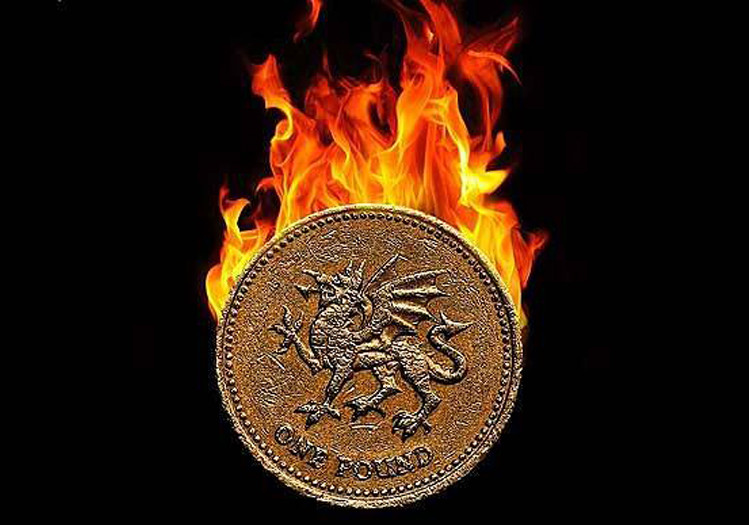
Recently, the British currency has been making the market nervous. Experts see the reason for this tension in the unpredictable behavior of the GBP, which, in addition to excessive volatility, sometimes demonstrates inadequate dynamics.
Currency strategists at Bank of America Merrill Lynch (BoAML) believe that the pound has recently acted as the currency of emerging markets, and not as a solid means of payment from the Big Ten (G-10). At the moment, the pound is demonstrating its worst qualities, inherent mainly in the currencies of developing countries. These include the presence of a double deficit, which consists of the total budget deficit and the current account of the balance of payments.
According to BoAML, the British economy expects an increase in the double budget deficit to 10% of production next year. This is more than in a number of developing countries, emphasized in BoAML. This condition is caused by a prolonged economic downturn in the UK and large-scale government spending. BoAML believes that the British deficit, reminiscent of that in developing countries, will greatly worsen the pound. Brexit uncertainty and the negative effects of the COVID-19 pandemic can worsened the situation.
An additional "provocateur" of the decline in GBP, along with a growing budget deficit that could soar up to 14% of GDP this fiscal year, will be the problem of Britain's exit from the EU. Many experts doubt the possibility of a trade deal between London and Brussels, which would help the British economy to avoid collapse at the end of the year.
The United Kingdom's monetary authorities are doing everything possible to maintain and speed up the recovery of the national economy, which was severely declining due to the pandemic. It can be recalled that in March 2020, the Bank of England reduced its key rate to 0.1% twice to help economic growth in the country. However, the measures taken were insufficient: in May, the volume of the UK public debt soared above 100% of GDP for the first time since 1963. According to experts, this indicates a large-scale decline in economic production in the country and a sharp increase in costs.
The current situation reinforces the unbalanced pound, the dynamics of which are constantly "jumping". According to BoAML, this keeps the market in tremendous stress and forces many traders to abandon GBP. In the current situation, experts recommend selling the pound against the euro, the yen and the Swiss franc. At the same time, experts recall that the state of the British currency in the GBP/USD pair depends on the dynamics of the greenback. It can be noted that over the past five years, the British currency has lost more than 21% of its value in relation to the American one. According to BoAML estimates, this is the largest drop among G-10 currencies. The pound's movement vector focuses on a possible decrease in USD. Moreover, it can also be recalled that recently, the main world currency is also experiencing tremendous "overload", and its global leadership remains in question.
The prolonged nervous tension observed in the financial market prevents the pound from finding equilibrium. The BoAML noted that the pound is sensitive to the slightest changes in the external and internal background, "mirroring" the general nervousness. Such swings instantly affect the dynamics of the GBP/USD pair: on Wednesday morning, June 24, it suddenly fell 0.18% to 1.2490. During the day, the pair declined and was in the range of 1.2441 - 1.2442 in the evening. Thursday morning, June 25, the GBP / USD pair met at critically low levels of 1.2417 - 1.2418. Experts record further plunging of the pound into a downward spiral.
Contrary to market expectations, positive macroeconomic statistics did not help the pound increase. This surprised analysts, since there were all prerequisites for the growth of GBP. According to IHS Markit, the current month, the PMI for Purchasing Managers Index for the UK manufacturing sector rose to 50.1 points from the previous 40.7 points recorded in May. The composite business activity index, which rose to 47.6 points, also showed good results. The experts were also pleased with the indicator for the service sector, which reached 47.0 points compared with 29.0 points noted in May. However, the pound did not take advantage of the positive statistics and continued to drop, causing bewilderment of the market.
The British currency, becoming one of the problem currencies in the Group of 10 (among the leading world currencies), is a reflection of its economy. According to analysts, the UK economy has faced a number of difficulties caused by both "long-standing" (Brexit) and new (negative consequences of COVID-19) problems. The main task of the pound is to overcome them. Experts rely on the stability of GBP, which can strengthen its position in the medium-term and will not put itself and the market on the edge of a nervous breakdown.





















